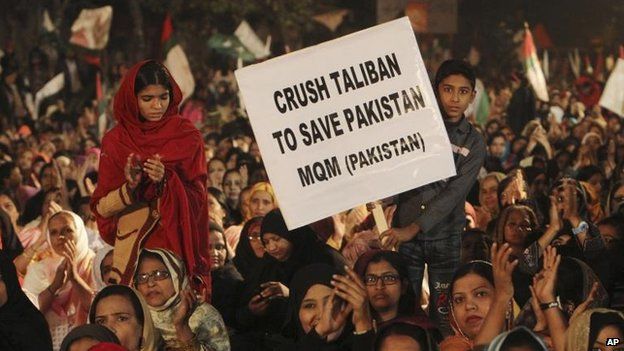Pakistan resumes executions after Peshawar school attack
- Published

Pakistan has carried out two executions, the first since a death penalty moratorium was lifted after a deadly attack on a Peshawar school.
One of those executed was convicted over an attack on Pakistan's Army HQ in 2009, the other over an assassination attempt on ex-leader Pervez Musharraf.
The UN had earlier urged Pakistan not to resume its executions.
Some 141 people, all but nine of them children, died in the Taliban attack on the Army Public school in Peshawar.
Pakistan's military carried out operations against Taliban units in areas near the border with Afghanistan on Friday, saying it had killed 59 militants.
'Different crimes'
The two executions were carried out in the central city of Faisalabad late on Friday, officials said.
Pakistani media named the two executed men as Aqeel, alias Dr Usman, and Arshad Mehmood.
Usman was arrested during the raid on the Rawalpindi HQ and sentenced to death in 2011.
Mehmood was sentenced to death over the attempt on Mr Musharraf's life in the same city in 2003.
The home minister for Punjab province, Shuja Khanzada, told Associated Press: "Today's executions of terrorists will boost the morale of the nation, and we are planning to hang more terrorists next week."
The Pakistani army chief has so far reportedly signed the death warrants of six terrorism convicts.
UN human rights spokesman Rupert Colville had earlier urged Pakistan not to resume executions.
He said: "To its great credit, Pakistan has maintained a de facto moratorium on the death penalty since 2008," he said, adding that those at risk of imminent execution were unconnected to the "premeditated slaughter" in Peshawar.
"We urge the government not to succumb to widespread calls for revenge, not least because those at most risk of execution in the coming days are people convicted of different crimes."
The human rights organisation Reprieve warned that innocent people could be executed as a result of the government's decision, accusing the authorities of routinely overusing anti-terrorism laws to secure convictions.
It said Pakistan had the world's largest number of death-row inmates - with more than 8,000 people awaiting execution.
Prime Minister Nawaz Sharif lifted the moratorium on executions in terror cases amid outrage at the massacre of the children.
The country's de facto foreign minister, Sartaj Aziz, said the Peshawar attack was his country's own "mini 9/11" and required a sea-change in its fight against terrorism.
Special classes were held in Pakistan on Friday in which schoolchildren chanted prayers in memory of the victims of the massacre.
The Taliban said that the attack was an act of revenge for its own losses in the army's military offensive.